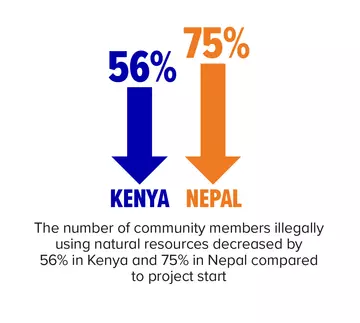
People living on the edges of national parks and other protected areas in Kenya and Nepal face daily threats from wildlife.
Crops may be trampled by elephants, livestock attacked by carnivores and people themselves injured or killed. Many of the people who live in these areas have very limited options for income generation, so livelihoods are heavily reliant on natural ecosystems.
We are working to inspire, inform, and empower people to protect and restore wildlife.
Without enough money to meet their basic needs throughout the year, some people are pushed to the limit to feed their families. This often means risking their lives to gather firewood, fodder and graze their livestock. This can also lead to over exploitation of natural resources, resulting in habitat degradation and fragmentation. This has disastrous consequences for both the local people and endangered wildlife.
Helping people and wildlife live better together
Thanks to the incredible generosity of donors to our For People, For Wildlife appeal in 2019, we launched our project in 2020 to support four communities in Kenya and Nepal to co-exist more harmoniously with wildlife by building financial resilience, improving livelihoods and creating opportunities to forge positive relationships with wildlife authorities. Coupled with mitigation techniques to reduce human-wildlife conflict, the project aimed to reduce the costs of living alongside wildlife to discourage engagement in wildlife crime and enable the stewardship of vital ecosystems.
The 3-year project had four key activities
- Establishing community banks or village savings and loans associations to increase financial and social capital.
- Supporting community members to diversify their livelihoods to include wildlife-friendly enterprises that decreased their reliance on natural resources, improving their quality of life and food security, and increasing their support for conservation.
- Improving human-wildlife coexistence by supporting farm-based measures to reduce conflict with wildlife and protect livelihoods, such as predator-proof enclosures for livestock.
- Improving relationships between community members and protected area staff through outreach and engagement activities.
Creating a more balanced world
By the end of the project, community members illegally using natural resources from the protected areas decreased by 56% in Kenya and 75% in Nepal.
The significant reduction in both countries is in part due to the project's community outreach activities, which helped to raise awareness of the rules and regulations surrounding wildlife crime and illegal natural resource use. Concurrently, the project's support to community members to build financial capital through local banking systems and diversify to more sustainable livelihoods has reduced their reliance on natural resources for subsistence and income.

Year-on-year increases in wellbeing scores for project participants was another huge achievement of the project. In Kenya, being part of a village savings and loans association not only motivated over 200 community members to begin saving money, but also enabled members to build their capacity, confidence and knowledge to establish new enterprises, including beekeeping, poultry and goat farming.
Similarly in Nepal, improved access to financial services through the community banks established through the project enabled the poorest members of the community to take out low-interest loans, increasing their ability to uplift their health, education and other aspects of their lives. This too meant starting new enterprises, such as farming, shopkeeping and opening beauty parlours, with 57% of all project participants generating an income by the end of the project.
In both countries, 80% of banking members were women, with activities also leading to stronger friendships between members and a sense of unity. This was particularly impactful in Nepal, where people of different ethnicities joined together for the very first time, and where women took up positions of chairperson, treasurer and secretary of the community bank.
Transforming evidence into meaningful action
To protect the new enterprises and reduce the costs of living next to a protected area, human-wildlife conflict mitigation plans were co-developed with community members and mitigation measures selected through a participatory approach. In Kenya, this included predator-proof livestock enclosures and apiaries, which were 100% successful at stopping predation attempts. In Nepal, mitigation activities included snake-proof corrals for chickens, planting of alternative crops that wild animals don’t eat and specially-designed scarecrows.
A key success of this project was the facilitation of regular outreach meetings between community members, protected area staff, and other project stakeholders. These meetings included drop-in sessions to discuss challenges and define solutions, as well as community bus tours into national parks. This provided multiple platforms for community members' voices to be heard; which alongside training in conflict mitigation and measures to protect crops and livestock, helped to improve attitudes towards conservation and increase people's perception of their ability to cope with wildlife conflict.
When we join together, everything is possible. Our landmark project delivered significant results for both people and wildlife to create long-term harmony and change for the better. It is our vision that this will have a lasting impact to support coexistence with wildlife and the protection of these important habitats in Kenya and Nepal.
Find out more - download our project impact report
Partners
- Tsavo Trust
- Five Talents
- Wildlife Works
- Kenya Wildlife Service
- Himalayan Nature
- Mithila Wildlife Trust
- Department of National Parks and Wildlife Conservation, Nepal
Funders
UK Aid Match (FCDO)
This project was made possible by donors to our 'For People, For Wildlife' appeal in 2019, which raised over £1.5 million, including £702,074 of matched funding from the UK government.
